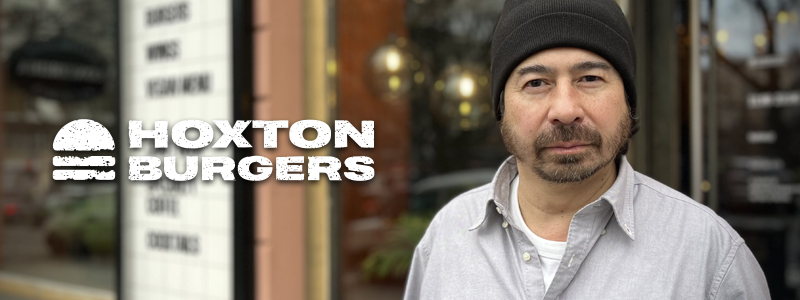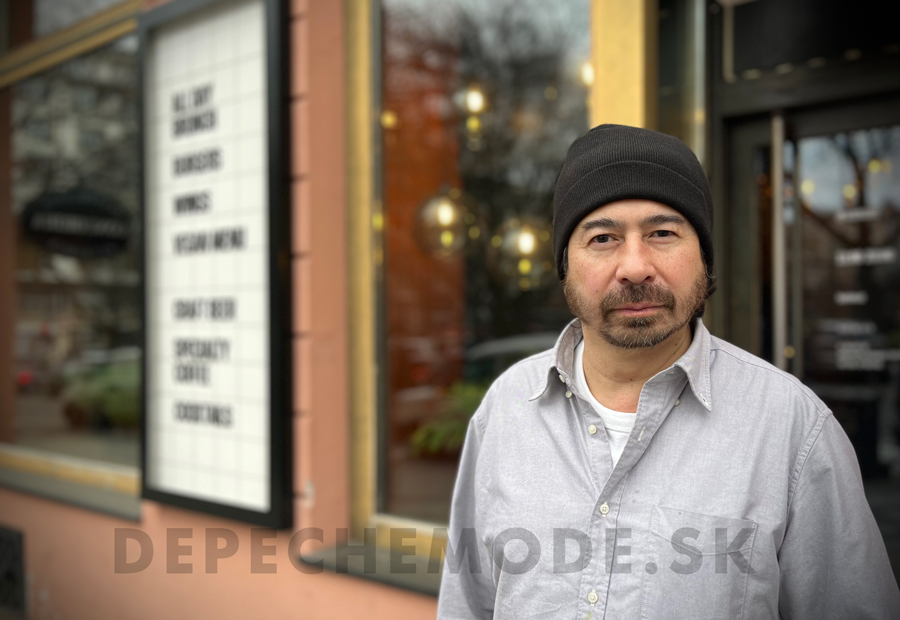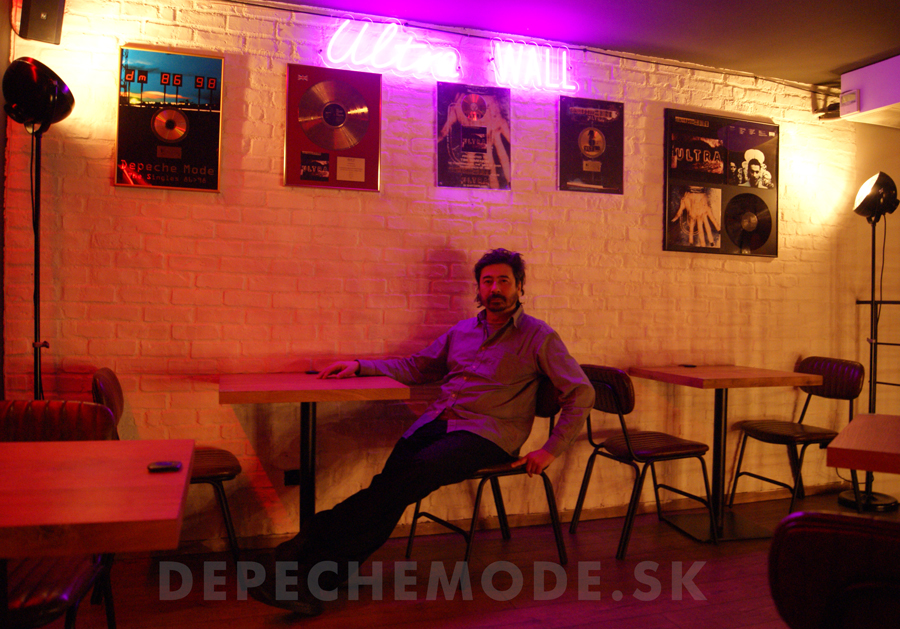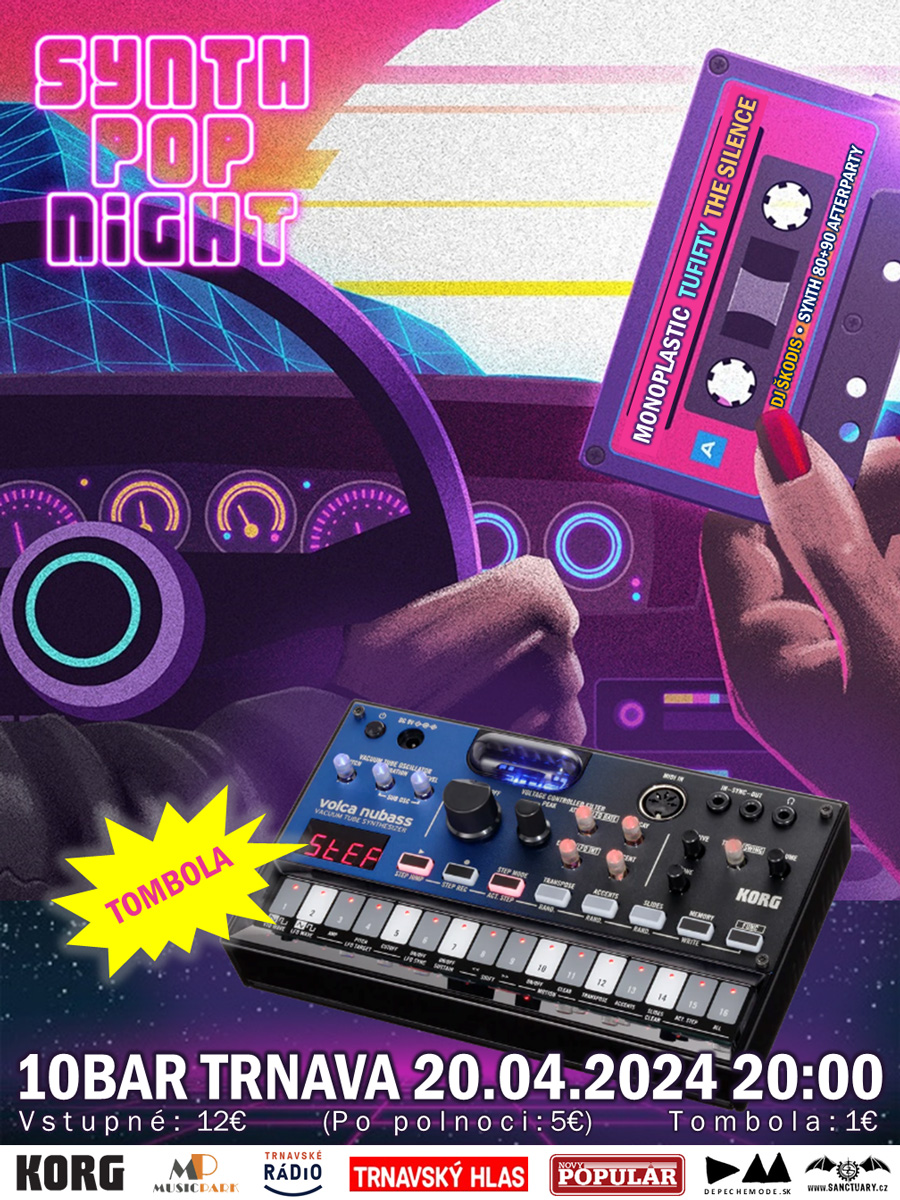Tim Simenon’s “Ultra Wall”

Tim Simenon: Depeche Mode producer now bringing gourmet burgers to Prague.
Prague's Hoxton Burgers features a special wall dedicated to the Depeche Mode LP Ultra. It includes a number of gold discs awarded to the album's producer Tim Simenon, who today operates the funky restaurant and personally prepares its trademark artisanal burgers.
Hoxton Burgers on Náměstí Míru is co-run by Tim Simenon, an Englishman who moved to Prague from Vienna in the middle of the last decade to open a previous high-end fast food business in the city, Brixton Balls.
Prior to that, the Englishman had a whole other life and career – in music. As Bomb the Bass, he had a massive hit in his early 20s with Beat Dis, a track that helped catapult then nascent sampling technology to the top of the charts.
Simenon released several Bomb the Bass LPs and became increasingly sought after for his production and remixing skills, bringing his cutting-edge dance nous to tracks by huge 1990s names such as Seal and Neneh Cherry.
Bomb the Bass were on the dance label Rhythm King, which shared a building with Mute Records in West London. Simenon was friendly with Mute's founder Daniel Miller, who brought him into contact with the imprint's flagship artists – then one of the biggest acts on the planet – Depeche Mode.

"I had got into their music when I was a still at school and followed all their releases really," says Tim Simenon, whose favourite Depeche LPs were Music for the Masses, Black Celebration and Violator.
After doing a number of remixes for Depeche Mode, in late 1995 Simenon – who had also wowed the group with his work on Gavin Friday's Shag Tobacco record – found himself in contention to oversee their next album.
Simenon impressed further during a trial period when he worked on three tracks with the musicians and got the nod to produce and mix the album. "I think Daniel and the band took a chance," he says modestly.
However, it was an unusually turbulent time for the group. Long-time member Alan Wilder had just quit Depeche and singer Dave Gahan was going through a well-documented period of serious drug addiction.
"Alan had left after Songs of Faith and Devotion and Dave was doing his thing. Martin and Fletch were going, Is it going to be a Martin Gore solo album?" says Simenon. "But somehow we did eventually get it all together."
Initial recording took place at Simenon's London studio, before a stay in New York – where Gahan was based – to record the vocals. It was between those two sessions that Martin Gore wrote Ultra's powerful lead single Barrel of a Gun.
Typically Gore would bring his own demos of the tracks to the table. The producer would then "rip them apart", change the pitch to suit Gahan's voice and then strip away as much as possible in order to let the potency and beauty of the songs shine through. "The idea for me was always, Less is more," he says.
Simenon recalls the three members of Depeche Mode as very different types. He says that the late Andy Fletcher – who contributed little to song construction – was something of a "layman" in the band, offering opinions on what worked and what didn't. "He got to the point, without the BS, and just said what he thought."
The producer says the musical void filled by Wilder was in part filled by the small crew of collaborators he regularly worked with at the time.
There were also special guest musicians on the 1997 LP, including legendary Can drummer Jaki Liebezeit, who Simenon brought in to perform on The Bottom Line.
"We got Jaki to play probably the least drums ever," he says with a chuckle. "But apparently he liked the track and said Ultra was his favourite Depeche album."
The producer says Ultra, which took a full 15 months, was the longest music job of his career, but is also one he looks back on with huge fondness. "I'm really proud to have been part of it – really proud."

That pride is reflected in the "Ultra Wall" – featuring those words written out in pink neon – on one of the exposed brick walls of Simenon's current venture, Hoxton Burgers, which opened last August.
Beneath the sign are three gold discs he received for producing Depeche's ninth studio LP, as well as one for follow-up release The Singles 86–98, a compilation that features Barrel of a Gun and It's No Good.
Visitors can also check out a number of gold discs earned by the producer with other artists and enjoy cool curated playlists from Simenon, who in the past was also a highly successful DJ.
And of course they can savour some of the very best burgers in the Czech Republic, including Hoxton's speciality, the excellent Smash Burger, personally prepared by the Englishman and his business partner Nikita.
Simenon says the Ultra Wall does bring in Depeche Mode aficionados – adding that he counts himself among their number. "I still get excited when a new single comes out, and I've been playing Ghosts Again on a loop," he says. "I'm still a fan on that level."
When the band bring the tour for new LP Memento Mori to Prague's Letňany airfield at the end of July this year their old producer will be there. "I'm still in contact with Martin," Tim Simenon says. "I'll go and see the band, and then hang out backstage and catch up."
Hoxton Burgers: the website www.hoxton.cz & location, Instagram
Author: Ian Willoughby
Čítať a pridávať komentáre môžu iba zaregistrovaní a prihlásení depešáci.
Vytvorte si účet Prihláste sa

Názory Devotees (9)